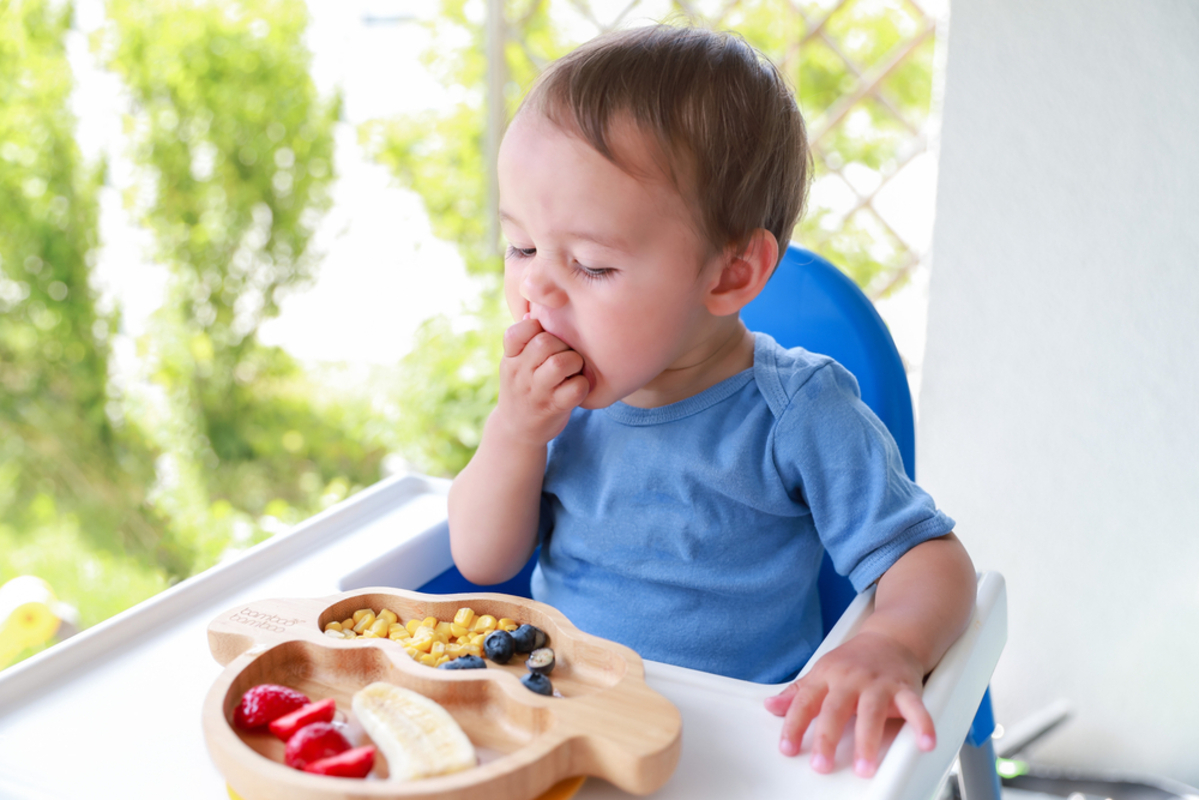You’ve made your little one a perfect plate filled with a delicious meal she can enjoy, so why is your toddler holding food in her mouth? Is your bub trying to tell you that you’re a bad cook, or is she simply playing with her food and still trying to learn how to chew it?
There could be many reasons behind this behavior, and most of them aren’t a cause for concern. If she’s been breastfeeding for a long time, then it’s normal for your little one to be confused by solid food once you start giving it to her.
It’s quite impressive how long babies can hold food in their mouth and not swallow it or spit it out. It’s like trying to feed a baby squirrel! The most important thing is that you’re not alone in this, so don’t worry, mama. Our little ones can be quite challenging when it comes to eating.
Holding food in their mouth, also known as food stacking or food pocketing, is super common, and it happens for a number of reasons. If you don’t know why your bub is doing it, or what you can do to make her eat her meals properly, keep on reading. We’ll deal with this together.
What is food stacking (pocketing)?

If you imagine a squirrel with nut-filled cheeks when you hear of food pocketing, you’re not far off. Your baby might look like a little chubby chipmunk if she refuses to swallow her meals. Food pocketing is nothing more than your baby holding food inside of her mouth without swallowing it.
Whether it’s because she’s over-stuffing her mouth or she doesn’t know how to swallow, there are different methods to help your baby eat properly. If this continues, make sure you talk to your pediatrician.
Although food stacking usually isn’t a sign of something serious, there’s still a chance your baby might be dealing with an underlying health issue you aren’t aware of. If nothing you do works, your doctor will help you understand your baby’s behavior.
Why is my toddler holding food in her mouth?
If your toddler is holding food in her mouth every time she eats, it’s time to get to the root of the problem. She can’t keep her meals in her cheeks forever! Whether it’s one reason or a few different ones, we’ll try to figure it out together. Let’s explore the most common causes.
1. There’s too much food in her mouth
I know you want your baby to get enough food, but you have to be careful about how big her bites are. Not only does stuffing her mouth with food make it hard for her to swallow it, but it’s also a choking hazard.
In fact, having too much food in the mouth is one of the most common reasons they refuse to swallow it. Instead of struggling with that much food going through their throat, they’ll rather keep it in their mouth until you take it out.
I mean, it happens to the best of us. I’m sure you’ve been so hungry one day that you’ve over-stuffed your mouth with food. Even as experienced as you are, it was still hard for you to chew and swallow it. It’s the same with your little one.
2. She doesn’t like the taste

Listen, your toddler may be young, but she can have her likes, dislikes, and preferences. If she’s refusing to swallow her food, there’s a high chance you have a picky eater on your hands. Don’t take it to heart, mama, it doesn’t mean your cooking is bad.
If she’s eating veggies, maybe she’s in the mood for something sweet instead! Or maybe she simply doesn’t like what you prepared for her, so she’d rather keep it in the pockets of her cheeks like a little hamster than have to swallow something she doesn’t like. Real princess behavior.
3. She has trouble swallowing
One of the more serious causes of your toddler holding food in her mouth is the possibility that she has some trouble swallowing her meals. It could be her coping mechanism if swallowing becomes too uncomfortable or even painful.
If you notice this, make sure you take her to your doctor as soon as possible. Finding the exact reason your baby might find swallowing uncomfortable can be hard without the help of a pediatrician. There could be many causes, including swollen tonsils, sore throat, chronic reflux, and more.
Unfortunately, this fear of swallowing can cause this behavior to become a habit. If that happens, you need to work on removing these mental blocks as soon as possible. Your doctor will give you proper advice once they examine your little one and, with the right therapy, everything should be okay.
4. Sensory issues

Since your baby is still learning, growing, and developing her senses, it might be hard for her to control the food in her mouth. It could be that she’s still getting used to the texture of soft and solid food, and she doesn’t know how to process the sensation yet.
Sensory issues play a big role in food pocketing. If you’ve noticed your baby struggling to process loud noises, bright lights, or eating, there’s a chance she might be dealing with some sensory issues.
This kind of behavior is common with kids who suffer from sensory processing disorder or even autism. Don’t diagnose your baby yourself. If you suspect she might be dealing with any of these issues, make sure you talk to her pediatrician first.
How to deal with food stacking?
So, food stacking is fairly common, but how do you deal with it? You can’t just let your toddler keep the food inside of her mouth forever! And, you shouldn’t. Here are some things you can try out and see if they bring any change.
1. Give her smaller bites
If your baby is struggling to swallow food because she’s eating too fast or stuffing her mouth, try giving her smaller bites. In case she’s eating on her own, cut her meals into smaller pieces and show her that she should eat them one by one.
Most of the time, this will be sufficient for your toddler to start swallowing her food. If there’s less food she has to chew and swallow, she won’t have to keep it all stacked in her cheeks.
2. Try giving her soft food

Maybe your toddler still doesn’t like the texture of solid food. Because they’re still learning how to process new textures and tastes, babies might refuse to swallow their food because it’s still unfamiliar to them.
Soft food is always a good choice because it’s easy to swallow thanks to its smooth texture. Your baby doesn’t have to chew, and her mouth won’t feel stuffed with food that feels unfamiliar. On top of that, giving your baby some soft food will make it easier for you to give her healthy meals.
Throw different veggies inside a blender and make your baby the most delicious healthy meal she could get. In fact, make enough mash for your whole family to eat, and she’ll probably be happy to join all of you.
3. Give her something to drink
One thing that might help your baby swallow the food is teaching her to take a sip after she’s done chewing. If she’s old enough to understand you, explain to her that sipping water after chewing will help the food go down into her belly more easily.
Try to stay away from straws or sippy cups. Give your baby an open cup, as it might help her to swallow the food more easily. It allows her to sip more water, which will flush her mouth better.
4. Help her learn how to swallow

This might seem silly to you, but you need to teach your baby everything. Sometimes, you need to teach her how to swallow, too, and that’s completely okay. There’s nothing wrong with your toddler if she’s afraid of swallowing her food, or seems unsure about how to do it.
Take some food and store it in your cheeks, just like your little one does. Once you get her attention, explain everything that’s happening inside of your mouth. Tell her how you’re moving your tongue, and how you’re using your teeth to chew on your food.
Encourage her to do it together with you. If she’s scared to do so, demonstrate it a couple of more times and encourage her that she’ll be okay.
5. Have patience
And, no matter how annoying it can get, don’t let your frustration show. I know it seems simple to you, but swallowing can be challenging for some toddlers, and they need support and encouragement from the person they trust the most. Don’t let your child be afraid of trying, learning, and making mistakes.

